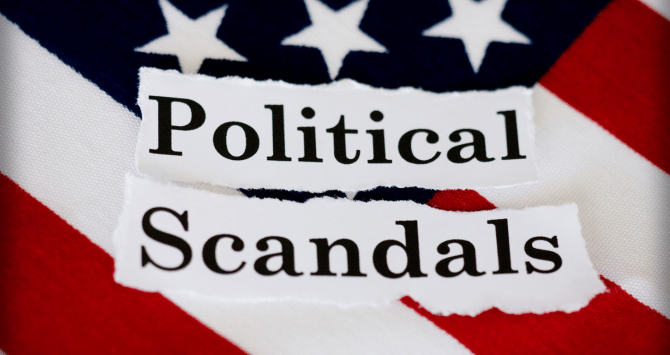The world has witnessed political scandals that have shaken governments, tarnished reputations, and left indelible marks on the fabric of society. From clandestine affairs to corrupt schemes, these scandals have captivated public attention and shaped the course of political history. In this article, we delve into some of the most notorious political scandals, shedding light on the events, individuals involved, and the profound impact they had on the world.
Bill Clinton Infidelity Scandal (1998)

The Bill Clinton Infidelity (more commonly known as the “Monica Lewinsky scandal”) is one of the most infamous political controversies in recent American history. The scandal came to light in 1998 and involved President Bill Clinton’s extramarital affair with Monica Lewinsky, a young White House intern. The revelations shook the nation and led to a high-profile impeachment trial, creating a media frenzy and forever changing the political landscape.
Monica Lewinsky was a 21-year-old intern at the White House when she began a sexual relationship with President Clinton. The affair reportedly lasted from 1995 to 1997. When news of the relationship broke in early 1998, it sent shockwaves through the country. President Clinton initially denied any involvement with Lewinsky, stating, “I did not have sexual relations with that woman, Miss Lewinsky,” during a televised address.
However, as evidence mounted, including the discovery of a blue dress with Clinton’s DNA, he was forced to admit the truth. In a grand jury testimony, Clinton stated, “I misled people, including even my wife. I deeply regret that.” The scandal led to impeachment proceedings against Clinton on charges of perjury and obstruction of justice. The House of Representatives voted to impeach him, making him only the second U.S. president to be impeached.
“I misled people, including even my wife. I deeply regret that.”
– President Bill Clinton
Throughout the impeachment process, public opinion on the scandal was sharply divided along partisan lines. Many of Clinton’s supporters saw the impeachment as politically motivated, while his critics viewed it as a necessary consequence of his actions. Despite the impeachment, Clinton remained in office, as the Senate did not reach the two-thirds majority vote required for conviction. However, the scandal had a lasting impact on Clinton’s presidency and legacy.
In the years following the scandal, Monica Lewinsky became a controversial figure herself, facing public scrutiny and media attention. She has since spoken out about the affair, reflecting on the intense public shaming she endured and advocating for more compassionate treatment of individuals involved in high-profile scandals. The Monica Lewinsky scandal continues to be a pivotal moment in American political history, serving as a cautionary tale about the consequences of private actions on public figures and the power of media scrutiny in shaping political narratives.
Iran-Contra Affair (1985-1987)

The Iran-Contra Affair, a complex and controversial political scandal, rocked the Reagan administration in the mid-1980s. The scandal involved covert arms sales to Iran, despite an arms embargo, and the diversion of proceeds to fund Nicaraguan rebels known as the Contras. The affair raised serious ethical and legal concerns, tarnishing the reputation of the Reagan administration and leaving a lasting impact on American politics.
The roots of the Iran-Contra Affair can be traced back to the Reagan administration’s efforts to secure the release of American hostages held in Lebanon by Iranian-backed militants. In an attempt to improve relations with Iran, National Security Council (NSC) staff members, including Lt. Col. Oliver North, secretly facilitated arms sales to Iran, hoping to gain the hostages’ freedom. The transactions involved selling weapons to Iran and then using the proceeds to fund the Contras, who were fighting against the leftist government of Nicaragua.
As news of the covert operations came to light in 1986, the Reagan administration faced severe criticism and calls for investigation. President Ronald Reagan addressed the nation, attempting to explain the administration’s actions, saying, “My purpose was… to send a signal that the United States was prepared to replace the animosity between Iran and the United States with a new relationship.” Despite his attempt to justify the operations, many viewed the actions as a violation of U.S. policy and laws.
“My purpose was… to send a signal that the United States was prepared to replace the animosity between Iran and the United States with a new relationship.”
– President Ronald Reagan
The Iran-Contra Affair sparked congressional hearings and investigations, revealing the extent of the covert operations and the involvement of high-ranking officials within the administration. Oliver North, a central figure in the scandal, testified before Congress, admitting to his role in the affair. He famously defended his actions, stating, “I came here to tell you the truth, the good, the bad, and the ugly.”
In the aftermath of the Iran-Contra Affair, several high-ranking officials were indicted and convicted on charges related to the scandal. The affair had a lasting impact on American politics, raising questions about the limits of executive power, the role of the NSC, and the importance of transparency in government actions. The Iran-Contra Affair remains a significant chapter in U.S. history, serving as a reminder of the complexities and consequences of covert operations and the need for accountability in the highest levels of government.
Profumo Affair (1963)

The Profumo Affair, a sensational political scandal that unfolded in 1963, rocked British politics and society. The scandal revolved around John Profumo, the Secretary of State for War in the Conservative government, and his relationship with Christine Keeler, a young model and showgirl. The affair came to light amid allegations of espionage, as Keeler was also romantically involved with a Soviet naval attaché. The revelations of sex, politics, and espionage captivated the public’s attention and had far-reaching consequences for the British government.
John Profumo was a prominent figure in the Conservative government of Prime Minister Harold Macmillan. He was married to Valerie Hobson, a well-known actress. The affair with Christine Keeler began in 1961 but only came to public attention in March 1963 when Keeler’s former boyfriend, Johnny Edgecombe, fired gunshots at the door of her friend’s flat. The ensuing media coverage and police investigation exposed the affair and raised concerns about potential national security implications.
As the scandal unfolded, Profumo initially denied any impropriety, leading to his now-famous statement in the House of Commons on March 22, 1963: “There was no impropriety whatsoever in my acquaintanceship with Miss Keeler.” However, as evidence mounted, including a photograph of Keeler sitting naked on a chair owned by Profumo, he was forced to admit the truth. On June 5, 1963, he admitted to the affair, stating, “I was wholly and solely to blame for the lie which I told to the House… I misled you all, my friends, and I want to say that I am most profoundly sorry.”
“I was wholly and solely to blame for the lie which I told to the House… I misled you all, my friends, and I want to say that I am most profoundly sorry.”
– John Profumo
The Profumo Affair had profound political repercussions. Profumo’s resignation in disgrace left a void in the Conservative government, and the scandal contributed to the resignation of Prime Minister Macmillan later that year. The affair also raised concerns about the potential security risks posed by Keeler’s relationships with influential individuals from both the British and Soviet establishments. The scandal exposed the intertwining of sex, power, and espionage in the corridors of political power and left an indelible mark on British politics and society.
Watergate Scandal (1972-1974)

The Watergate scandal, which unfolded in the early 1970s, remains one of the most infamous and consequential political scandals in American history. The scandal centered around the Nixon administration’s attempt to cover up its involvement in the break-in at the Democratic National Committee headquarters at the Watergate complex in Washington, D.C. The revelations of illegal activities, abuses of power, and attempts to obstruct justice had far-reaching implications, ultimately leading to the resignation of President Richard Nixon.
The Watergate scandal began on June 17, 1972, when five men were arrested for breaking into the Watergate building, intending to wiretap phones and steal documents from the Democratic Party. As the investigation unfolded, it became evident that the break-in was not an isolated incident but part of a larger campaign of political espionage and sabotage orchestrated by members of Nixon’s administration.
The scandal escalated when it was revealed that the Nixon White House had attempted to cover up its involvement in the break-in. A secret taping system installed in the Oval Office to record conversations proved to be a critical piece of evidence. When the existence of the tapes came to light, Nixon refused to release them, claiming executive privilege. This led to a constitutional crisis and a dramatic clash between the presidency and the judicial system.
In the face of mounting evidence and the threat of impeachment, Nixon announced his resignation on August 8, 1974. In his resignation speech, he stated, “I have never been a quitter. To leave office before my term is completed is abhorrent to every instinct in my body. But as President, I must put the interests of America first.” Vice President Gerald Ford was sworn in as the 38th President of the United States, marking the first time in American history that a president had resigned from office.
“I have never been a quitter. To leave office before my term is completed is abhorrent to every instinct in my body. But as President, I must put the interests of America first.”
– President Richard Nixon, during his resignation
The Watergate scandal had a profound impact on American politics and public trust in government. It exposed the abuses of power and the importance of transparency and accountability in the highest levels of government. The fallout from Watergate led to a series of reforms aimed at restoring public confidence in the political system, including campaign finance reform and strengthened checks and balances. The legacy of Watergate continues to shape the country’s political landscape and serves as a reminder of the enduring importance of upholding democratic principles and the rule of law.
Political scandals have a profound impact on public trust in government institutions and the individuals who hold power. These notorious scandals, with their trail of deceit, betrayal, and intrigue, have shaped political narratives and left a lasting impression on the course of history. From Watergate to the Profumo Affair, the consequences of these scandals resonate through time, reminding us of the fragility of power and the need for transparency and integrity in the political arena.





